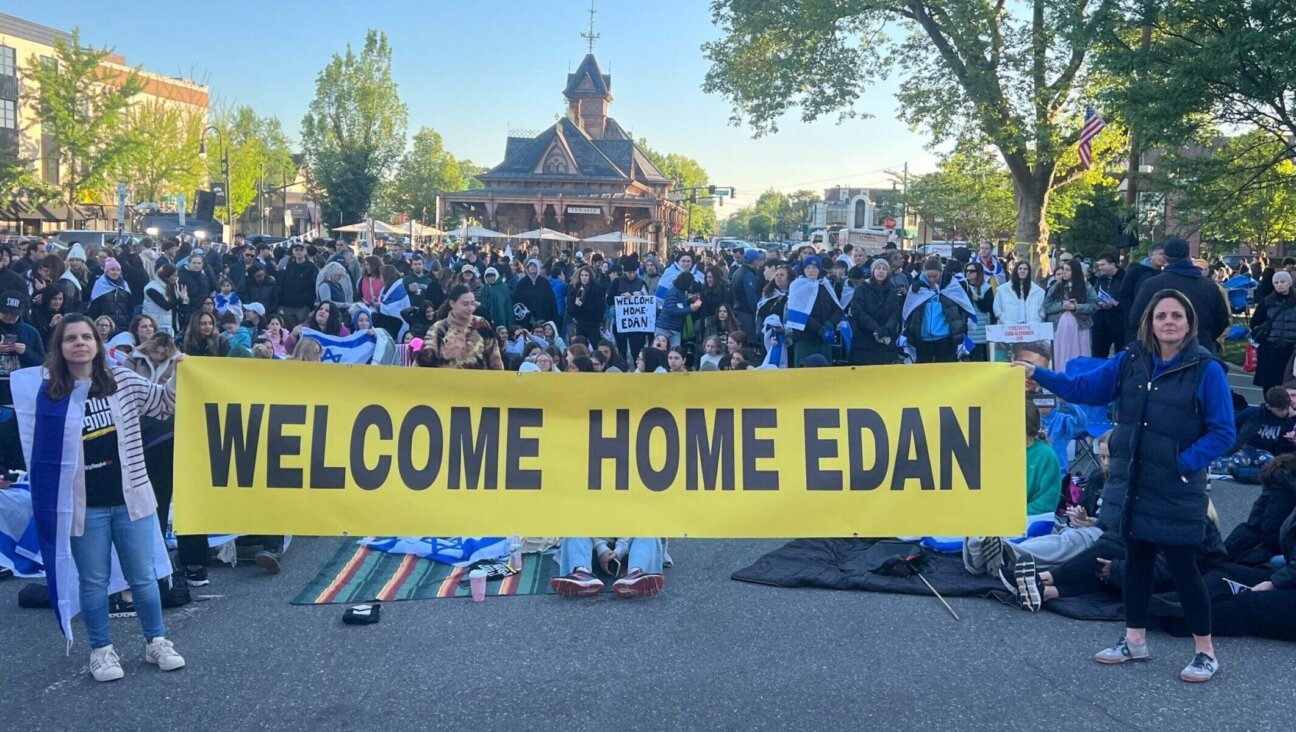Genesis Prize oligarch says he’s too broke to move to Israel

Mikhail Fridman Image by Getty
Embattled Russian-Israeli billionaire Mikhail Fridman, hit by sanctions from both the European Union and the United Kingdom, said Wednesday that he could not afford to leave London for Israel.
In an interview with Bloomberg News, when asked whether he would take advantage of his Israeli passport and head to Tel Aviv or Jerusalem, Fridman “waved” off the idea, according to the reporter because “he doesn’t own a home there and doesn’t have access to money to buy one.”
“I’m a prisoner here,” Fridman told the reporter, who observed that he was “looking slightly frazzled,” in a North London cafe wearing “a blue cashmere sweater, a T-shirt, and jeans” joking that he may need to clean his $85 million London home because he wouldn’t be able to pay the housekeeper.
“I don’t know how to live,” he said to the same journalist in a follow-up phone call. “I don’t know. I really don’t know.”
Fridman is well-known in the world of Jewish philanthropy as a co-founder of the Genesis Prize, a million-dollar annual prize for achievement branded as the Jewish Nobel.
The tycoon said he had been “in shock” since learning that he and his partners who founded Alfa-Bank, Russia’s largest privately held bank and have extensive holdings in Western Europe were the targets of EU sanctions that had frozen their private assets because of their ties to Russian President Vladimir Putin.
Fridman’s activities have been centered at the London-based private equity firm LetterOne for the past decade. In the first week of March, Fridman and his partner Petr Aven – another Genesis Prize co-founder – were resigned from the firm they built, and were locked out of its offices, had their stake in the firm frozen, and blocked from documents and communications with employees. On March 15, the UK followed the EU’s lead and issued personal sanctions on the pair, along with other Russian businessmen.
He “is now in the strange position of being an oligarch with essentially no cash,” leaving him with no working bank card and requiring him to seek permission from the British government before spending any money, according to the Bloomberg report, which said that on paper, Fridman’s net worth has dropped from $14 billion to $10 billion.
Fridman, who was born and raised in Ukraine, was one of the first oligarchs with ties to Russian President Vladimir Putin to issue a public call for an end to the Ukraine war, saying on February 28 that the invasion was it a “tragedy” and saying “war is not the answer,” although his words stopped short of any direct criticism of the Russian leader.
Fridman co-founded the Russian Jewish Congress, and rose to prominence in the world of Jewish philanthropy together with his partners, Petr Aven, German Khan, and Stan Polovets, founded the Genesis Philanthropy group in 2007. They are best known for creating the Genesis Prize, a million dollar annual prize given each year to an individual “for their accomplishments and commitment to Jewish values, inspiring Jews to connect to their heritage and to Israel.” It has been awarded to a long list of celebrities, who have went on to distribute the money to their pet causes.
The Genesis Philanthropy Group also donates to groups including Birthright Israel, Yad Vashem, Hillel and Friends of the IDF. In the first week of March, the “Leadership” section of the group’s website which included the names and photographs of the key funders – Fridman, Aven, and Khan, was eliminated.
The organization announced on March 1 that it would give $10 million in emergency assistance to Jews impacted by the crisis in Ukraine, with the first $5 million provided “immediately.” However, the Bloomberg article reported that “Jewish organizations in Ukraine keep asking [Fridman] where his $10 million donation is.”
In the interview, Fridman said that punishing oligarchs for Putin’s actions was a misguided strategy that showed little understanding for the way in which power dynamics operate in Russia.
“If the people who are in charge in the EU believe that because of sanctions, I could approach Mr. Putin and tell him to stop the war, and it will work, then I’m afraid we’re all in big trouble,” he said.
No matter how wealthy any businessman might be “to say anything to Putin against the war, for anybody, would be kind of suicide,” he added.
The Forward is free to read, but it isn’t free to produce

I hope you appreciated this article. Before you go, I’d like to ask you to please support the Forward.
Now more than ever, American Jews need independent news they can trust, with reporting driven by truth, not ideology. We serve you, not any ideological agenda.
At a time when other newsrooms are closing or cutting back, the Forward has removed its paywall and invested additional resources to report on the ground from Israel and around the U.S. on the impact of the war, rising antisemitism and polarized discourse.
This is a great time to support independent Jewish journalism you rely on. Make a gift today!
— Rachel Fishman Feddersen, Publisher and CEO
Support our mission to tell the Jewish story fully and fairly.
Most Popular
- 1

Fast Forward Ye debuts ‘Heil Hitler’ music video that includes a sample of a Hitler speech
- 2

Opinion It looks like Israel totally underestimated Trump
- 3

Culture Is Pope Leo Jewish? Ask his distant cousins — like me
- 4

Fast Forward Student suspended for ‘F— the Jews’ video defends himself on antisemitic podcast
In Case You Missed It
-

News In Edan Alexander’s hometown in New Jersey, months of fear and anguish give way to joy and relief
-

Fast Forward What’s next for suspended student who posted ‘F— the Jews’ video? An alt-right media tour
-

Opinion Despite Netanyahu, Edan Alexander is finally free
-

Opinion A judge just released another pro-Palestinian activist. Here’s why that’s good for the Jews
-
Shop the Forward Store
100% of profits support our journalism
Republish This Story
Please read before republishing
We’re happy to make this story available to republish for free, unless it originated with JTA, Haaretz or another publication (as indicated on the article) and as long as you follow our guidelines.
You must comply with the following:
- Credit the Forward
- Retain our pixel
- Preserve our canonical link in Google search
- Add a noindex tag in Google search
See our full guidelines for more information, and this guide for detail about canonical URLs.
To republish, copy the HTML by clicking on the yellow button to the right; it includes our tracking pixel, all paragraph styles and hyperlinks, the author byline and credit to the Forward. It does not include images; to avoid copyright violations, you must add them manually, following our guidelines. Please email us at [email protected], subject line “republish,” with any questions or to let us know what stories you’re picking up.














